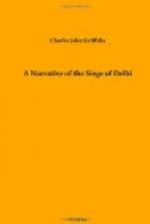The file-firing here was continuous, a perfect hail of bullets, and it was dangerous to show one’s head over the bank. Shouting and taunting us, the rebels came up close to the opposite side, and were struck down in numbers by our men, who rested their muskets on the bank and took sure aim. Still, the contest was most unequal; the enemy were wading in force through the water on our left, and the day would have gone hard with us from their overwhelming numerical superiority, when, just at this critical moment, the galloping of horses and the noise of wheels was heard in our rear.
Six Horse Artillery guns, led by Major Tombs—one of the most gallant officers in camp—came thundering along the road. They passed with a cheer, crossed the bridge at full speed, wheeled to their left, unlimbered as quick as lightning, and opened fire on the rebels. Taken completely by surprise, these made no stand, and fled pell-mell towards Delhi, leaving altogether 200 dead on the ground.
It was now nearly five o’clock, and we were distant four miles from camp. Many of our men had died from apoplexy and sunstroke, their faces turning quite black in a few minutes—a horrible sight. These, with the killed and the sick and wounded, were placed on the backs of a fresh lot of elephants, which had just arrived; and, scarcely able to drag one leg after the other, we turned our faces towards the camp, reaching our own quarters soon after sunset.
This was a terrible and trying day for all engaged, and more especially for the European infantry. We had been under arms for seventeen hours, most of the time exposed to the pitiless rays of an Indian sun, under fire for a considerable period, and, with the exception of the slight halt for breakfast, on our feet all the time.
When nearing camp we were met by the General, Sir Henry Barnard, who addressed us with some kindly words, and little did we think that that was the last occasion we should see the gallant old soldier. The following morning he was attacked with cholera, and expired in the afternoon, deeply regretted by the whole army.
No man could possibly have been placed in a more trying situation than he who had just given up his life in the service of his country. Called on to command an army to which was entrusted the safety of British rule in India, the cares and anxiety of the task, together with his unremitting attention to his duties and constant exposure to the sun, made him peculiarly susceptible to the disease from which he died. He had served with distinction in the Crimean campaign, and had only landed in India to take command of a division in the April of this year.
July 5.—From July 5 to 8 nothing of note occurred. The enemy kept up, as usual, a constant fire upon the ridge and outlying pickets; but no attempt at a sortie was made.
I visited the Flagstaff Tower each day when off duty, seemingly never tired of gazing at the glorious panorama spread out before me, and watching the batteries delivering their unceasing fire.




